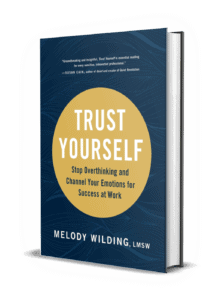In a world where life is busy, complex, and filled with stress, empathy is the glue that holds great workplaces together.
Empathy is the ability to detect others’ emotions and understand their perspective. When we feel accepted and validated, it builds trust and leads to better performance. Studies find that empathetic leadership has a direct impact on employee productivity, loyalty, and engagement.
Empathy isn’t reserved exclusively for our personal lives, either. It’s what you need to comfort a grieving co-worker, get people on board with your ideas, or diffuse tension with your boss, for example.
You don’t have to be professionally trained to be powerfully empathic. Humans are social beings, and our brains are wired for connection. So all you (yes, you!) have to do is give your empathy muscles a workout.
Steal these lessons I’ve learned as a coach in working with hundreds of clients to become a highly empathetic leader.
To Feel Empathy, Be Fully Present
Before I see clients, I create an environment where I feel comfortable and can focus fully. To create empathy in your workplace, you need to do the same.
Turn off your phone, or at least turn it face down. Silence email notifications. Better yet, leave your laptop behind before going into a meeting. Always give people your complete attention and respect. Wouldn’t you want the same?
Master the Art of Active Listening
As a coach, my responsibility is to help clients move past roadblocks so that they can take action to best support their goals. That all comes down to making sure I first understand their priorities and preferences.
Similarly, empathetic leadership requires that you listen non-judgmentally and leave your assumptions at the door. Instead, you want to use active listening skills to gain insight, including:
- Reflecting: “What I’m hearing you say is…” or “It sounds to me like…”
- Affirming: Smiling, nodding, or and brief verbal affirmations like “I see”, “mmhmm”
- Encouraging: “And then?”
Apply your personal style to these responses so they ooze authenticity. Make them your own.
Tune Into Non-verbal Communication
Communication runs deeper than words alone. If you notice someone tensing up, pulling away, or suddenly dodging eye contact, those are important clues that you can use empathy to connect.
When I sense a client having a strong reaction, such as anger or tears, I shift away from our typical action orientation towards exploration. Rather than letting them ignore the emotion coming on, I gently ask them to describe what’s happening to them. It gives them permission to share the stress they feel openly, knowing they won’t be judged or criticized.
You can do the same with your team members. If you see that someone is annoyed, gently inquire and ask, “What’s going on? Tell me more about what’s happening for you?”. Sometimes simply asking, “What’s on your mind?” will suffice to open the dialogue.
Practice Pausing
In an effort to be helpful, we often jump in to finish people’s sentences, offer advice, or interrupt.
Try this: During a conversation today, wait five seconds before responding. It’s uncomfortable! But you’ll be surprised by how effective it is to practice saying nothing at all.
Learning to get comfortable with silence is easily the most valuable skill I learned in grad school and it’s one you can use to build rapport, trust, and connection quickly.
Replace Advice-giving With Curiosity
Instead of offering your opinion, ask questions to better understand the other person’s perspective like:
- How do you feel about it?
- Can you tell me more?
- What do you mean?
- What would be helpful?
- What do you make of it?
Choose “we” Over “me”
Clients usually come to me feeling confused and isolated in their struggles. To let them know they are not alone, I quickly shift to talking about how we’ll tackle their challenges as a team — speaking in terms of “we” and “us” — so they feel empowered and supported.
Research shows changing your language is a step towards adopting an empathic attitude. People who use more second-person pronouns are better at interpreting others’ thoughts, feelings, and behaviors — the essence of empathy.
When you want to genuinely connect with someone, create a bond by talking about your shared goals (ie. “Let’s talk about what we’re going to do next to solve this,” “We’ll get through this”).
Imagine Their Point-of-view
I also try to step into my client’s shoes:
- What fears might they be facing?
- What positive change to they dream about?
Do this exercise yourself by practicing (internally) to assume that person’s point of view. Especially when you’re dealing with a difficult person, it’s important to assume positive intent. That is, give people the benefit of the doubt that they are coming from a respectful place, not a malicious one.
This mindset shift can do wonders for your mood to ensure you stay in an empathic state.
Work on Your Own Emotional Literacy
Hone your emotional vocabulary so that you can become more adept at spotting and naming those emotions in other people.
Even I have moments where I’m less compassionate than I’d like, just like anyone else (especially when I’m hangry – the struggle is real). When this happens, it’s a sign that I need to focus on restorative self-care.
Make sure to fill your own emotional reserves, too, because you can’t pour from an empty empathy cup.









